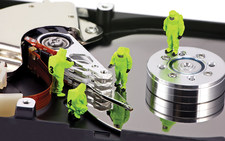Retrieving and setting hard drive parameters with hdparm
Disk Inspector

© Amy Walters, 123RF.com
Hdparm is the tool to use when it comes to tuning your hard disk or DVD drive, but it can also measure read speed, deliver valuable information about the device, change important drive settings, and even erase SSDs securely.
In 2005, Canadian Mark Lord developed the small hdparm utility [1] to test Linux drivers for IDE hard drives. Since then, the program has developed into a valuable tool for diagnosis and tuning of hard drives. For example, it tests the speed of hard drives and solid state disks, puts devices to sleep, and turns the energy-saving mode on or off. With modern devices, it can activate the acoustic mode and clean up SSDs. Before your first experiments with hdparm, you should read about safety concerns in the "Warning!" box.
Need for Communication
All reasonably new distributions already include hdparm in the basic installation. You only need to open a terminal and call up
hdparm -I /dev/sda | more
[...]
Buy this article as PDF
(incl. VAT)
Buy Linux Magazine
Subscribe to our Linux Newsletters
Find Linux and Open Source Jobs
Subscribe to our ADMIN Newsletters
Support Our Work
Linux Magazine content is made possible with support from readers like you. Please consider contributing when you’ve found an article to be beneficial.

News
-
Linux Mint 22.3 Now Available with New Tools
Linux Mint 22.3 has been released with a pair of new tools for system admins and some pretty cool new features.
-
New Linux Malware Targets Cloud-Based Linux Installations
VoidLink, a new Linux malware, should be of real concern because of its stealth and customization.
-
Say Goodbye to Middle-Mouse Paste
Both Gnome and Firefox have proposed getting rid of a long-time favorite Linux feature.
-
Manjaro 26.0 Primary Desktop Environments Default to Wayland
If you want to stick with X.Org, you'll be limited to the desktop environments you can choose.
-
Mozilla Plans to AI-ify Firefox
With a new CEO in control, Mozilla is doubling down on a strategy of trust, all the while leaning into AI.
-
Gnome Says No to AI-Generated Extensions
If you're a developer wanting to create a new Gnome extension, you'd best set aside that AI code generator, because the extension team will have none of that.
-
Parrot OS Switches to KDE Plasma Desktop
Yet another distro is making the move to the KDE Plasma desktop.
-
TUXEDO Announces Gemini 17
TUXEDO Computers has released the fourth generation of its Gemini laptop with plenty of updates.
-
Two New Distros Adopt Enlightenment
MX Moksha and AV Linux 25 join ranks with Bodhi Linux and embrace the Enlightenment desktop.
-
Solus Linux 4.8 Removes Python 2
Solus Linux 4.8 has been released with the latest Linux kernel, updated desktops, and a key removal.

